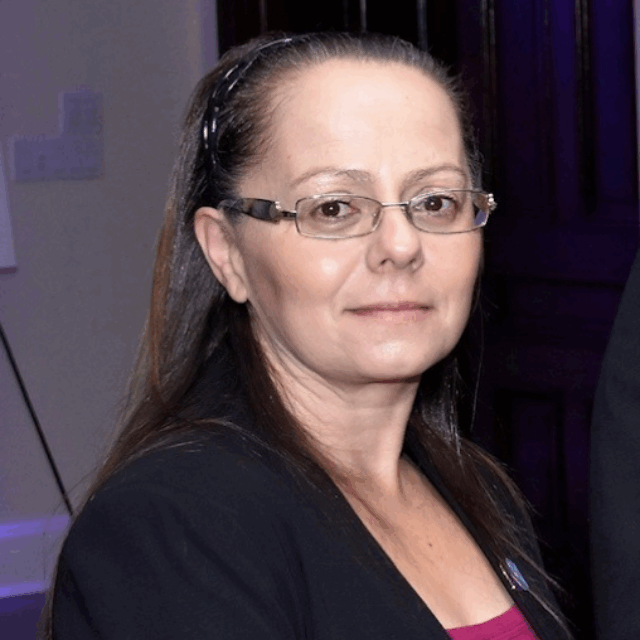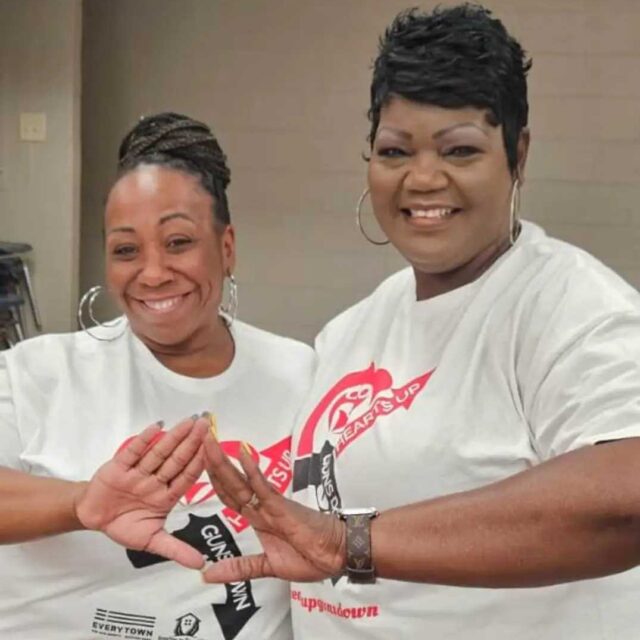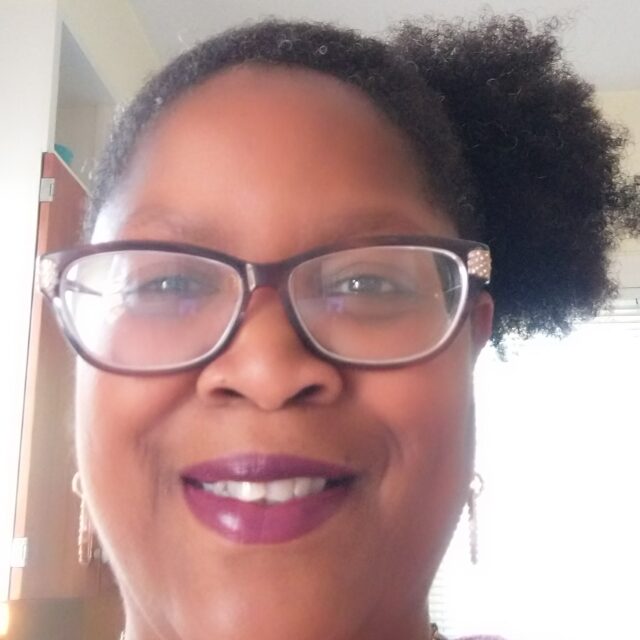Q&A: The Intersection Between Teen Dating Violence and Gun Violence

2.20.2025
February is Teen Dating Violence Awareness Month. Teen dating violence is a form of intimate partner violence. It can take the form of many behaviors, including:
- Physical or sexual violence
- Psychological aggression, like emotional manipulation or controlling behaviors
- Stalking
Get Help
Support for Teens and Young Adults:
Love Is Respect offers teen and young adult-specific support related to healthy relationships and dating abuse. Text “LoveIs” to 25522 or call 1-866-331-9474 to connect with an advocate. Help is free, confidential, and available 24/7.
Support for Anyone Experiencing or Concerned About Domestic Violence:
- If you or someone you know is experiencing domestic violence, please contact the National Domestic Violence Hotline by calling 1-800-799-SAFE (7233), texting “START” to 88788, or chatting online at thehotline.org. Trained advocates are available 24/7 to provide free confidential support to people anywhere in the US.
- You can also find more resources on legal assistance in English and Spanish at WomensLaw.org.
- Access the Everytown Support Fund Resource Guide for Survivors of Domestic Violence and Intimate Partner Violence. (Note: PDF opens in a new tab; it does not automatically download.)
Teen dating violence prevention has immediate and long-term impacts.
Teen dating violence is common. In 2021, about 1 in 8 high school students in the U.S. reported experiencing physical and/or sexual dating violence within the last year. Some teens experience this violence at a greater rate than others, including LGBTQ+ students and female students. Those who experience teen dating violence are more likely to:
- Experience depression and anxiety symptoms,
- Engage in substance use or other unhealthy behaviors,
- Exhibit antisocial behaviors, or
- Consider suicide.
988 Suicide & Crisis Lifeline offers crisis intervention services if you or someone you care about is struggling with thoughts of suicide. Call or text 9-8-8. Help is free, confidential, and available 24/7.
The impact of teen dating violence can last a lifetime. Violence in an adolescent relationship is a significant predictor of being either a survivor or a perpetrator of domestic violence or intimate partner violence in adulthood.
When we talk about teen dating violence, we must also address how it intersects with gun violence. A 2019 study found that over 60 percent of adolescents killed by an intimate partner were killed with a firearm. And in adulthood, access to a gun makes it five times more likely that a woman will die at the hands of a domestic abuser.
The Everytown Support Fund Domestic Violence Grant Program supports organizations on the frontlines of these dual public health crises. We asked four of these grantees why we need to talk about teen dating violence and gun violence prevention—both during TDVAM and year-round.
Answers have been edited for length and clarity.
Meet the Grantees
North Carolina, 2024 Grant Recipient
Moncherrie Williams, Executive Director of Hannah’s Place, Inc.
At Hannah’s Place, Inc., we work with community partners and families to raise awareness about domestic violence, and sexual assault. We link those we serve with resources that are available to support victims, including advocacy. We strive to meet the community and those in need where they are!
In 2024, we received an Everytown Support Fund Domestic Violence Grant. That funding allowed us to establish gun violence prevention and awareness materials for five townships in Halifax County, North Carolina. These materials include banners, flyers, and other supplies for meetings. Beyond the financial assistance, the Everytown Support Fund grant program has also given us crucial guidance and support as we implement other gun violence prevention efforts.
Arkansas, 2023 Grant Recipient
Jeannetta Gilliam Assistant Director/Victim Advocate at Families in Transition
Our mission is to empower individuals to break the cycle of violence by providing safety, shelter, support services, public education, and social and legal advocacy. At Families in Transition, we work with victims and survivors of:
- Domestic violence,
- Human trafficking,
- Sexual assault,
- Teen dating violence, and
- Surviving family members of homicide.
These people are never a number or a case file to us: They are survivors who deserve to be heard. The Everytown Support Fund Domestic Violence Grant helps us to protect our clients and to further our work around domestic violence awareness and gun violence prevention. The funds have also helped us host more awareness events in our community, including a Hearts Up, Guns Down campaign. The resources and programmatic support the grant provides have been invaluable.
Tennessee, 2024 Grant Recipeint
Jasmine Rogers, Director of Communications and Outreach at The Knoxville Family Justice Center
The Knoxville Family Justice Center is a crucial part of our community’s safety net. We provide safety planning, emergency relocation, and support services to community members impacted by violence. We follow the family justice center hub model, which gives survivors access to everything they need in one safe location. That means we host services like legal aid, counseling, and victim advocacy under one roof for survivors of domestic violence.
Many survivors of domestic violence live in fear for their lives, often because of the presence of a firearm in the home. The grant we received in 2024 has helped us, among other things, to partner with law enforcement to implement firearm removal programs. The funds also help us provide training and resources to equip KFJC staff and partners to handle cases involving firearms, improving their ability to intervene.
Maryland, 2023 Grant Recipient
Kristy Warren, Executive Director of the Montgomery County Family Justice Center (MCFJC) Foundation
At the MCFJC Foundation, we use a collaborative model that unites law enforcement, nonprofit organizations, businesses, and community partners. The combination of direct support, individualized care, prevention, and collaboration gives survivors of abuse a greater likelihood of achieving positive outcomes.
Prior to the COVID-19 pandemic, we typically supported around 1,350 families annually. But in 2020, as rates of domestic violence increased nationwide, more clients began seeking out our services. The Everytown Support Fund Domestic Violence grant has allowed us to expand our reach and offer more comprehensive support. In turn, this has improved the likelihood of favorable outcomes—both in terms of safety and healing—for more families. In 2023, we provided individualized wrap-around support to over 1,800 families.
The grant has helped us to expand our safety support through our LifeLine programs. We have used the funds to give security cameras to clients experiencing physical injuries, stalking, and threats. These cameras were especially useful when abusers would come to the home to threaten our clients but leave before the police arrived. The footage can provide crucial evidence to law enforcement in cases of violated protective orders.
Why do you feel it is important to talk specifically about violence faced by teens in dating or partnered relationships?
Moncherrie Williams (Hannah’s Place)
Early awareness is crucial in helping others and we strive to help teens recognize what healthy dating does—or does not—look like. Early intervention creates a greater chance that you can reduce the likelihood of someone experiencing domestic violence as an adult.
Jeannetta Gilliam (Families in Transition)
When we break the cycle of domestic violence early, we reduce the likelihood that it will become a learned or expected behavior as teens get older. But we must remember: Violence in teen relationships isn’t just a future problem—it can have immediate, and deadly, consequences.
On October 8, 2022, a 19-year-old young woman in our community was shot and killed by her estranged boyfriend. Her name was Je’Keya Hampton. Her parents had begun to see signs of toxic behavior from Je’Keya’s boyfriend and had pleaded with her to end the relationship. However, when she did so, her ex-partner became more erratic and began threatening her with violence. Tragically, he shot and killed her after luring her outside of her home.
When a survivor is leaving their abusive relationship, the abuser can feel a loss of control or power. Because of that, the time when someone like Je’Keya ends their relationship can be the most dangerous for them. Je’Keya and her parents did nothing wrong. The only person at fault for her death is the person who pulled the trigger.
At Families in Transition, we think of Je’Keya and her death often. We also strive to honor her memory—and that of the many others taken by domestic or dating violence—with action. We share resources daily with community members about what safe relationships look like. Equally important, we discuss how to recognize the signs of toxic behavior—just as Je’Keya’s parents did. And we share resources that can help someone in an abusive relationship to escape safely.
If you or someone you know is experiencing domestic violence, please contact the National Domestic Violence Hotline by calling 1-800-799-SAFE (7233), texting “START” to 88788, or chatting online at thehotline.org. Additionally, Love Is Respect offers teen and young adult-specific support related to healthy relationships and dating abuse. Text “LoveIs” to 25522 or call 1-866-331-9474 to connect with an advocate. Help is free, confidential, and available 24/7.
Jasmine Rogers (KFJC)
With the rise of digital communication, both teen dating violence and domestic violence have become more intertwined with technology. Teens may experience online harassment, cyberbullying, or digital stalking as a part of dating violence. These behaviors can carry over into adult relationships as a form of technological abuse in domestic violence.
We can prevent the continuation of abusive cycles and help young people build healthy, respectful relationships. Early intervention, education, and support are crucial throughout the process. And we can reduce both teen dating violence and gun violence by engaging schools and community organizations in violence prevention programs that focus on:
- Peer relationships,
- Emotional intelligence, and
- Violence-free conflict resolution.
Kristy Warren (MCFJC Foundation)
Studies show that raising awareness about teen dating violence and promoting healthy relationships during adolescence are among the most effective ways to prevent abuse and set expectations for healthy relationships in adulthood. The teens we work with so often say things like, “I didn’t know what I was doing was wrong,” or “My dad does the same thing with my mom that my boyfriend does with me.”
As a parent of a teenager, I am especially proud of our youth initiatives. These programs follow CDC guidelines to prevent domestic violence and intimate partner abuse in adulthood by promoting healthy relationships and early intervention. Our work addresses immediate needs while laying the groundwork for a safer future. I often say that my ultimate goal is to put myself out of business by helping to “inoculate” our teens against domestic violence. By providing education and modeling positive relationship behaviors, we can help teens build a foundation for safer, healthier relationships in the future.
Grant in Action: Jasmine Rogers, The Knoxville Family Justice Center
Recently, a 17-year-old came into our care carrying nothing but a trash bag and her baby. She had been kicked out by her parents and was facing an uncertain future with no place to turn. Thanks to the Everytown Support Fund Domestic Violence Grant, we could connect her with the help she desperately needed. Her story is just one example of how the Everytown Support Fund Domestic Violence grant directly impacts those in need, helping us to create immediate and meaningful change.
February is Teen Dating Violence Awareness Month (TDVAM). Why is it important to highlight the intersection between teen dating violence and gun violence?
Moncherrie Williams (Hannah’s Place)
Teen dating violence and gun violence can go hand in hand. That can come as a surprise to some people, as many teenagers aren’t old enough to legally purchase or possess a firearm. However, through family, friends, or other channels, youth can find ways to access a gun. Toxic relationships often involve a great deal of anger, frustration, and desire for control. When these intersect with access to weapons, there is potential for escalating physical and/or emotional violence against the abuser’s partner. Again, early awareness and interventions can make a huge impact in helping teens recognize the signs and know where to go for help!
6M
Nearly 6 million women reported having a gun used on them by an intimate partner.
Ruth W. Leemis et al., “The National Intimate Partner and Sexual Violence Survey: 2016/2017 Report on Intimate Partner Violence,” Centers for Disease Control and Prevention, October 2022, https://stacks.cdc.gov/view/cdc/124646. 4.7 percent of women (5.9 million) in the U.S. reported having a gun used on them by a current or former intimate partner at some point in their lifetime. While the survey question is up for interpretation by respondents and doesn’t provide further breakdowns, this count likely includes cases of being shot or shot at, hit with, and threats with a firearm.
Jeannetta Gilliam (Families in Transition)
It is so important to talk about teen dating violence early and often. If a teenager can recognize the signs of an abusive relationship, that can help prevent them from experiencing an abusive relationship later in life. Women are 5x more likely to be killed by an abusive partner when guns are involved. By interrupting the normalization of abusive relationships, teen dating violence awareness can be a form of gun violence prevention.
Jasmine Rogers (KFJC)
One of the main drivers of gun violence among teens is access to firearms. Whether through family members, friends, or illegal sources, many teens can access guns. This availability increases the likelihood of firearms being used in violent situations. And that reality is particularly concerning when considering that many teens lack the maturity or impulse control to handle firearms in emotionally volatile situations. Physical fights or disputes among teens can escalate quickly. The presence of a gun can turn what might have been a less severe conflict into a deadly situation.
Kristy Warren (MCFJC Foundation)
TDVAM and gun violence prevention are deeply interconnected. Both strive to address critical safety concerns for young people and their relationships. And they share the goal of creating safer communities where young people can thrive without fear of violence. Addressing the role firearms play in escalating violence is a key part of giving teens the tools to recognize and prevent abuse. Of course, teaching teens about healthy relationships includes sharing the warning signs of dating violence. But it must also involve advocating for policies that limit access to firearms for those with a history of abusive behavior. Through holistic violence prevention, we can help protect teens from potentially fatal outcomes.
“Violence in teen relationships isn’t just a future problem—it can have immediate, and deadly, consequences.”
—Jeannetta Gilliam, Families in Transition
How, if at all, are you and/or your organization marking TDVAM?
Moncherrie Williams (Hannah’s Place)
We are hosting two major events with Hannah’s Place. One is the “Teen Summit,” where we will convene a group of teens weekly to do a live video call discussing what goes on in today’s teen dating relationships. We’ll chat about all the factors that can come into play, especially the impacts of social media, peers, and family influence on relationships. Our second event is a teen interactive community engagement session. There, young people and community leaders will share knowledge—and fun!—to raise awareness for TDVAM.
Jeannetta Gilliam (Families in Transition)
Families in Transition is offering our resources to all the junior high and high schools in Crittenden County, Arkansas. These include:
- A curriculum to identify and prevent dating violence,
- Violence prevention materials in English and Spanish, and
- A comprehensive list of community resources and services.
Jasmine Rogers (KFJC)
During TDVAM, we are encouraging our community members—and those who read this blog!—to join in conversations. Some ways you can do so include:
- Creating or sharing posts on your social media accounts with facts, statistics, and information about TDVAM.
- Use relevant hashtags like #TDVAM or #LoveIsRespect to amplify your message.
- Consider linking to websites like Love Is Respect or Break the Cycle, which provide helpful information about recognizing unhealthy relationships, seeking help, and supporting survivors.
- Hosting an event at a local high school or community center. It can be a panel discussion, a speaker event, or a Q&A session with experts, survivors, and/or advocates.
- Collaborating with local nonprofits, shelters, and advocacy groups that focus on domestic violence or teen safety.
- Write a media piece for local newspapers or TV stations.
Kristy Warren (MCFJC Foundation)
The MCFJC Foundation sponsors a PSA video contest open to all 6th-12th grade students in Montgomery County, Maryland. Students create an original video about dating violence and abuse among teens. These PSAs can be in English or Spanish. And they need to address at least one of the following topics related to dating violence:
- Physical abuse, emotional/verbal abuse, technological abuse, financial abuse, or issues surrounding consent
- Examples of healthy behaviors in a relationship
- Bystander intervention: How to step in and help a friend who is being abused.
MCFJC also shares information about TDVAM in our newsletters and social media posts. But our awareness efforts continue beyond February. Through our year-round programming, we strive to break the cycle of violence and create safer futures for future generations.
We have also been fortunate to build a strong relationship with the local Moms Demand Action group. We have collaborated on events surrounding gun violence prevention and domestic abuse awareness to help broaden the reach of our two organizations. We are truly grateful for this partnership in promoting safety within our community.
“By promoting education about the warning signs of dating violence and advocating for policies that limit access to firearms for those with a history of abusive behavior, we can help protect teens from potentially fatal outcomes.”
—Kristy Warren, MCFJC Foundation
What can someone—whether they are a teenager or an adult—do if they are concerned about violence in their own relationship or what they are seeing in someone else’s?
Moncherrie Williams (Hannah’s Place)
Tell a trusted individual or adult. Seek out your family or people within your community to get the resources you need to support the individual at risk. If necessary, you can look into getting a domestic violence protection order, which can limit how close the abuser can get to you or the person at risk.
Jeannetta Gilliam (Families in Transition)
If you are in the Crittenden County, Arkansas, area, you can contact us directly on Facebook or by calling the numbers listed at the bottom of our website. The National Domestic Violence Hotline is also an excellent resource. You can reach the hotline by:
- Calling 1-800-799-SAFE (7233),
- Texting “START” to 88788, or
- Chatting online at thehotline.org.
Jasmine Rogers (KFJC)
For people in the Knoxville, Tennessee, area, KFJC can be a critical lifeline for a teen in an abusive relationship.
A key service we provide is safety planning, where we pair a teen in an abusive relationship with an advocate to develop a personalized safety plan. If a teen is in immediate danger, the KFJC can also provide crisis intervention. That can include:
- Helping the teen access emergency shelter,
- Connecting them with emergency services, or
- Providing a safe location where they can stay temporarily.
Teens may also need assistance understanding their legal rights, including the option to obtain a restraining order or protection order against their abuser. KFJC can help them consult with a criminal law attorney to ensure their personal safety.
Kristy Warren (MCFJC Foundation)
If you’re concerned about violence in a relationship, it’s important to approach the victim with care. Let them know you are concerned for their safety and well-being. Do not confront the abuser, especially in volatile situations, as this can escalate the danger. If there is immediate danger, call 911.
Additionally, there are free workshops for bystanders that outline steps to support someone in need while maintaining their safety. Teens who are concerned for themselves or others can seek out a trusted adult.
Anyone can help by sharing national or local resources like the Montgomery County Family Justice Center. At the MCFJC, all services are free, Spanish-speaking staff are available, and immigration status is not a barrier to receiving help. It’s important to remember that abuse is never the fault of the victim, and help is available.
Learn more
Learn more about Hannah’s Place, Inc.
Learn more about Families in Transition.
Learn more about The Knoxville Family Justice Center.
Learn more about the Montgomery County Family Justice Center Foundation.





